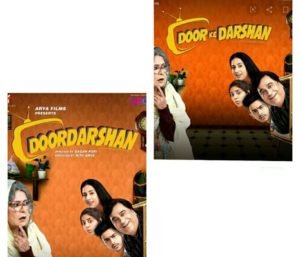A suit was filed by Prasar Bharti against Ritu Arya, Sandeep Arya and PVR Limited for permanent injunction to restrain them from using Prasar Bharti’s registered trademark “Doordarsan” as the title of their new film which is produced by Ritu and Sandeep Arya and PVR is the official distributer for the same. The court in an order dated 27.02.2020 opined that the plaintiff had a prima facie case and that the balance of convenience was also in favour of the plaintiff but refrained from passing any ex parte order restraining the defendants from using the mark DOORDARSHAN as title of their film or elsewhere in the film considering that the defendants’ film was scheduled to release the day after i.e on 28th February 2020. The court noted that granting any order at that stage would not have given defendants ample opportunity to make the requisite changes before the release of film, resulting in monetary and business damages as well as inconvenience/loss to persons other than the defendants. The matter was listed for urgent hearing and was accordingly taken up on 02.03.2020 where it directed the defendants to make appropriate changes in the Film within two days so as to ensure the title of the film as well as any other material contained thereunder does not infringe the Plaintiff’s registered mark.
This is not the first case of infringement that has been filed with respect to a film’s title. There have been a number of such cases in the past which we will discuss further but before that let us have a look upon a few provisions that help in protecting a movie’s title.
One of the ways by which a movie title can be protected is by the way of registration with associations such as the Indian Motion Picture Producers’ Association (IMPPA), the Association of Motion Pictures and Television Programme Producers (AMPTTP) and the Film and Television Producers’ Guild of India (Guild). These associations play an important role in protecting the commercial interests of people involved in production of a film and hence the industry customarily functions through these associations. Before registering the title, the association generally substantiates with other associations as to ascertain whether the same or deceptively similar title has been registered with another association. However such registration only establishes priority in the adoption of title of film and authorship of the script.
One of the legal provisions under which a film title can be protected is the Trade Marks Act, 1999. A movie title can be protected under under Schedule 4, class 41 of Trademarks Act, 1999. Considering the increased culture of online streaming, the registration of a title under class 9 has also become important.
Some of the cases with respect to Movie title infringement are discussed below:
Simba vs Simmba
A beverage company sued Rohit Shetty Picturez LLP for infringing its registered trademark “SIMBA” by the Defendant’s film titled ‘SIMMBA’. It was put forth by the plaintiffs that it holds trademark registration in multiple classes with respect to its beverages, merchandise, apparel accessories etc while the Defendants argued that the mark was not registered in the same class as that of the defendant and that there would be no likelihood of confusion among the two. The dispute finally resulted in a Trademark License Agreement being signed between the two parties and the matter was disposed off.
The “Humara Bajaj” case
This is a famous case of IP infringement with respect to movie titles where one of India’s largest two wheeler production company, Bajaj Auto Ltd. sued John Abraham’s production house J.A Entertainment Pvt. Ltd. over its upcoming film’s title “Humara Bajaj” while the Defendants argued was based on the Protagonist of the film Mr Sanjay Bajaj. The plaintiffs claimed that such usage of its famous tagline and registered trademark “Humara Bajaj” would cause confusion and deception in the minds of the general public and would infringe the plaintiff’s rights under the Trade Mark Act, 1999. The court finally decided the matter in favour of the plaintiff and passed an order granting permanent injunction thereby restraining the defendants from using the plaintiff’s mark in the movie in any manner.
Biswaroop Roy Choudhary v. Karan Johar [‘Kabhi Alvida Na Kehna’]
This is an interesting case where Biswaroop Roy Choudhary had already registered the title “Kabhi Alvida Naa Kehna” under class 41 of the Trade Marks Act, 1999 but Karan Johar produced a film under the same title and it was ready for release. When the case came before the Delhi High Court, It was decided that although the defendant had not registered the title with the Registrar of Trademarks, the defendant was the actual user of the mark, and in fact had completed the production of the film which was ready for release. It was taken into consideration that if the name was change at such a stage where the movie was ready for release it would not be commercially viable for the defendants and hence interim relief was denied to the plaintiff while noting that the actual use of the phrase was a relevant factor which needed consideration. It was also noted that the title of the single film can be registered as a trademark only when it has achieve a secondary meaning.
Kanungo Media Pvt Ltd v. RGV Film Factory
This is one of the important cases when it comes to protection of movie titles under trademark law. A Bengali movie ‘Nisshabd’ was produced by The Kanungo Media Pvt. Ltd but it could not be released due to commercial viability. Later Ram Gopal Varma produced a movie under the same title “Nishabd” for which an infringement action was brought against him. While deciding this case the court observed that “Trademarks Act states that for trademark to be protected it should have distinctive character. Moreover, generic terms cannot be protected as trademarks. Movie names usually consist of generic terms and phrases. Hence, such movie names cannot be protected as trademarks. Only those movie names which have a distinctive character and which do not contain generic terms can be registered.”
The case was decided in favour of RGV Film factory based on the fact that the plaintiff’s film has not acquired secondary meaning.
‘Sholay’
Sholay Media and Entertainment Pvt Limited filed a suit against Ram Gopal Varma and others for infringing their registered trademark Sholay in the upcoming movie “Ram Gopal Varma Ke Sholay”. During the proceedings of the court it was observed that Sholay was a blockbuster with even its characters being so popular that their names were protected under copyright law apart from the already trademarked title ‘Sholay’ and character name ‘Gabbar Singh’ under multiple classes. The court ultimately decided in favour of the plaintiffs and the name of the defendants’ movie was changed and Rs 10 Lakhs were granted to the plaintiffs as punitive damages and a cost of Rs. 50,000 was also imposed.
‘Youngistaan‘
Pepsico filed a suit against MSM Motion Pictures to restrain it from using the word “Youngistaan” in its movie title because it was an already registered trademark by Pepsico. The parties ultimately entered into an agreement with the defendants and the defendants agreed to give a disclaimer at the end of the beginning title credits stating that the movie is not related to or associated with, sponsored or promoted in any manner by Pepsi or Pepsi’s Youngistaan campaign.
These are a few among the many cases where the titles of movies have become a reason for litigation under intellectual property law. Though there are a number of guidelines that have been set out in the above mentioned cases like Kanungo Media Pvt Ltd v. RGV Film Factory and others, there remain a number of loopholes and undecided questions pertaining to the issue.

















